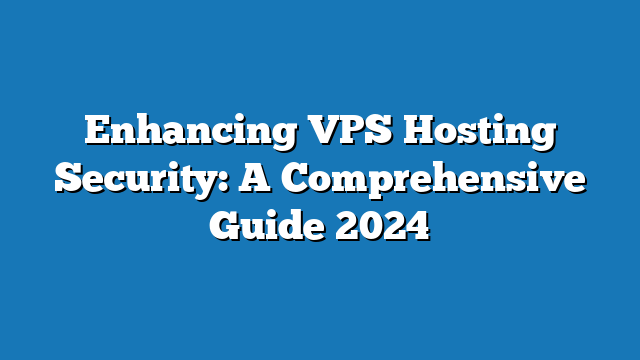Discover the essential aspects of VPS hosting security. Learn how to secure your VPS, protect your data, and ensure a safe hosting environment.
Table of Contents
- Introduction
- Understanding VPS Hosting Security
- Why VPS Hosting Security is Crucial
- Key Aspects of VPS Hosting Security
- Best Practices for VPS Hosting Security
- Choosing a Secure VPS Hosting Provider
- Conclusion
- FAQs
Introduction
In the digital age, ensuring the security of your web hosting environment is paramount. VPS hosting security is a critical aspect of maintaining a safe and reliable website. This guide delves into the various elements of VPS hosting security and provides actionable tips to protect your data and server.
Understanding VPS Hosting Security
VPS hosting security refers to the measures and protocols implemented to protect a Virtual Private Server from unauthorized access, attacks, and data breaches. Unlike shared hosting, VPS hosting provides a more secure environment with isolated resources and customizable security settings.
Why VPS Hosting Security is Crucial
The importance of VPS hosting security cannot be overstated. A secure VPS environment ensures the integrity and confidentiality of your data, protects against cyber threats, and maintains the smooth operation of your website. Security breaches can lead to data loss, financial losses, and damage to your reputation.
Key Aspects of VPS Hosting Security
Firewalls
Firewalls are a fundamental component of VPS hosting security. They act as a barrier between your server and potential threats from the internet. Firewalls monitor incoming and outgoing traffic and block malicious activities. Configuring a robust firewall is essential for preventing unauthorized access.
DDoS Protection
Distributed Denial of Service (DDoS) attacks can overwhelm your server with traffic, causing downtime and disrupting services. Implementing DDoS protection is a vital aspect of VPS hosting security. DDoS protection services detect and mitigate such attacks, ensuring your server remains accessible.
Regular Backups
Regular backups are crucial for VPS hosting security. In case of a security breach or data loss, having up-to-date backups allows you to restore your server quickly. Automated backup solutions can simplify this process, ensuring that your data is always protected.
SSL Certificates
SSL certificates encrypt data transmitted between your server and users, protecting sensitive information such as login credentials and payment details. Implementing SSL certificates is a standard practice in VPS hosting security, enhancing trust and data protection.
OS and Software Updates
Keeping your operating system and software up-to-date is critical for VPS hosting security. Updates often include patches for security vulnerabilities. Regularly updating your system ensures that you are protected against the latest threats.
Access Controls
Access controls are essential for managing who can access your VPS. Implementing strong access controls, such as limiting root access and using SSH keys, enhances VPS hosting security. Ensure that only authorized personnel can access your server.
Best Practices for VPS Hosting Security
Use Strong Passwords
Using strong, unique passwords for your server and applications is a basic yet crucial step in VPS hosting security. Avoid using easily guessable passwords and consider using a password manager to generate and store complex passwords.
Implement Two-Factor Authentication
Two-factor authentication (2FA) adds an extra layer of security by requiring a second form of verification in addition to your password. Implementing 2FA can significantly enhance VPS hosting security by making it harder for attackers to gain access.
Regularly Monitor Server Logs
Regular monitoring of server logs helps detect suspicious activities and potential security breaches. Analyzing logs can provide insights into unauthorized access attempts and other security incidents, allowing you to respond promptly.
Disable Unused Services
Disabling unused services and applications reduces the attack surface of your server. By minimizing the number of services running on your VPS, you can enhance VPS hosting security and reduce the risk of exploitation.
Choosing a Secure VPS Hosting Provider
Selecting a secure VPS hosting provider is critical for ensuring the safety of your server. Look for providers that offer robust security features, such as firewalls, DDoS protection, regular backups, and 24/7 support. For a reliable and secure VPS hosting option, consider BigBirdWeb’s unmanaged VPS hosting.
For additional secure VPS hosting options, check out Infinity Server and Ultimate Free Host.
Conclusion
Ensuring VPS hosting security is essential for protecting your data, maintaining website performance, and safeguarding your reputation. By implementing the security measures and best practices outlined in this guide, you can create a robust and secure hosting environment for your website.
FAQs
What is VPS hosting security?
VPS hosting security involves measures and protocols to protect a Virtual Private Server from unauthorized access, attacks, and data breaches.
Why is VPS hosting security important?
VPS hosting security is crucial for protecting data integrity, preventing cyber threats, and ensuring the smooth operation of your website.
How can I improve my VPS hosting security?
Improve your VPS hosting security by implementing firewalls, DDoS protection, regular backups, SSL certificates, OS and software updates, and strong access controls.
What are some best practices for VPS hosting security?
Best practices include using strong passwords, implementing two-factor authentication, regularly monitoring server logs, and disabling unused services.
How do I choose a secure VPS hosting provider?
Choose a provider that offers robust security features, such as firewalls, DDoS protection, regular backups, and 24/7 support.
What role do firewalls play in VPS hosting security?
Firewalls act as a barrier between your server and potential threats, monitoring and blocking malicious traffic to protect your VPS.
